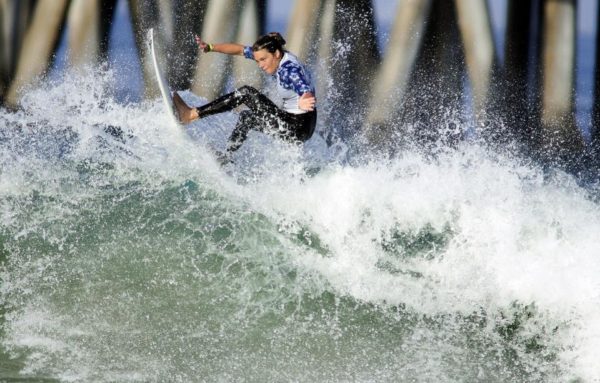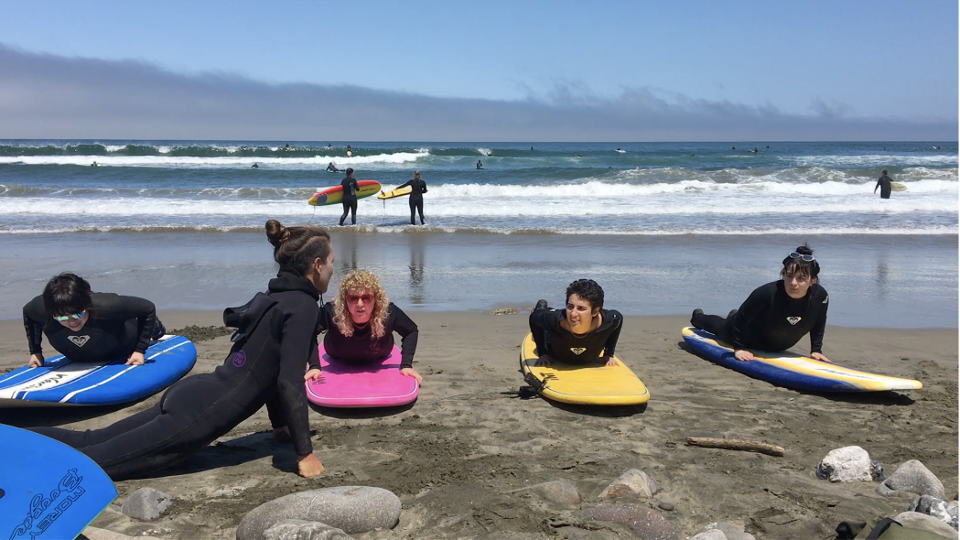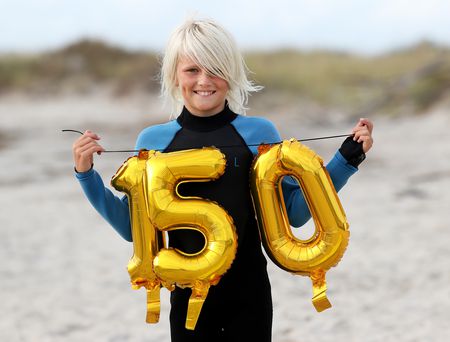
Kyla Langen (USA) during the US Open of Surfing. Huntington Beach, CA. (Photo by Stan Liu /Icon … [+] SMI/Icon Sport Media via Getty Images)
Corbis/Icon Sportswire via Getty Images
Gay surfer Kyla Langen says the beach can be an intimidating place for queer people, and especially queer people of color. In the traditionally gender and heteronormative space, Langen says, “The strongest white, [cisgender] man gets all the waves.”
“It’s such a paradox,” she says, “Because on one hand the ocean is this wild, open, free, beautiful space, and then on the other hand it’s this very territorial and hierarchal space.”
Because of all of this and more, Langen launched the San Francisco-based organization, Queer Surf, which offers lessons, meetups, and retreats for LGBTQ+ people interested in surfing. The goal is to create a safe space where queer people can learn to surf, as well as to build an active queer surfing community.
“It has been amazing,” Langen says. “It has just changed people’s lives. It’s wild. I mean it sounds so extreme, but we’ve had a lot of people tell us that.”
Several people who have joined Queer Surf have told Langen they’ve always been interested in the sport but never felt like there was a place for them to experience it to the fullest. Many people have told her they felt intimidated by group lessons dominated by “bro-ey” cisgender men.
Langen has been surfing since she was a kid and competed professionally for twelve years, participating in World Surf League professional tours. During her career, she faced many challenges due to both her gender and sexuality.
“The industry was and still is very heteronormative,” she says, “definitely still sexualizing women for marketing, and it was no different then. If you were trying to get sponsored, you needed to be sexy. You needed to surf well, but mostly you needed to be really marketable to a broader audience. So there were a lot of queer and gay women on the tour, but it was definitely hush hush.”
Langen says many queer women surfers did not feel safe being out to their sponsors. Even more, those who did not present as femme struggled to gain sponsorship at all.

A lesson with Queer Surf
Nicci Brisebois
“People with more butch presentation couldn’t hold sponsorship, and they surfed just as well, if not better, than other people who could get sponsorship easily,” she says.
With Queer Surf, Langen is proud to have helped make the ocean more accessible. “Every time I see somebody who hasn’t surfed and they’re riding a wave,” she says, “Just the joy on their face, it’s amazing that we’ve helped people get to the waves and helped people have the skills to be comfortable and confident in the water.”
But the culture of the beach still presents its challenges. Langen says they have faced aggressive and angry men in the water who have yelled at them and told them to get out. Even in 2020, she says, this is still happening.
Finances are also a hurdle. Surfing is expensive, as is traveling to the beach. As the organization grows, Langen hopes to open chapters across California, and she also wants to hold international retreats.
“That’s another big piece,” she says, “Just traveling for queer folks doesn’t often feel like the safest thing, so creating that opportunity for people is what we’re hoping to do.”
Langen also plans to create a social platform where queer surfers can communicate with one another and make plans to surf together. Much of this is already happening between Queer Surf participants over text, she says.
This social aspect is one of the most significant pieces to Langen. Now, she says, “They have a community of people to ask to go [surf], and people looking out for each other in the water.”





Recent Comments